MGBBT1TEN - Tourism Environment: Sustainable Tourism in UK Essay
VerifiedAdded on 2023/06/08
|8
|2295
|312
Essay
AI Summary
This essay provides a comprehensive overview of sustainable tourism in the UK, examining its core concepts, principles, and the importance of minimizing negative impacts on societies and the environment. It explores the practices of sustainable tourism in the UK, highlighting destinations such as Edinburgh and Brighton. The essay also delves into the roles of key stakeholders, including the government, private sectors, and tourists, in promoting sustainable tourism development. Furthermore, it analyzes the influence of macro factors (political, economic, social, technological, legal, and environmental) and micro factors (intrinsic and extrinsic motivations, tourist personalities) on the demand for tourism activities in the UK, offering insights into the industry's current state and future prospects. The essay concludes by emphasizing the critical role of sustainable tourism in fostering economic growth and environmental protection.
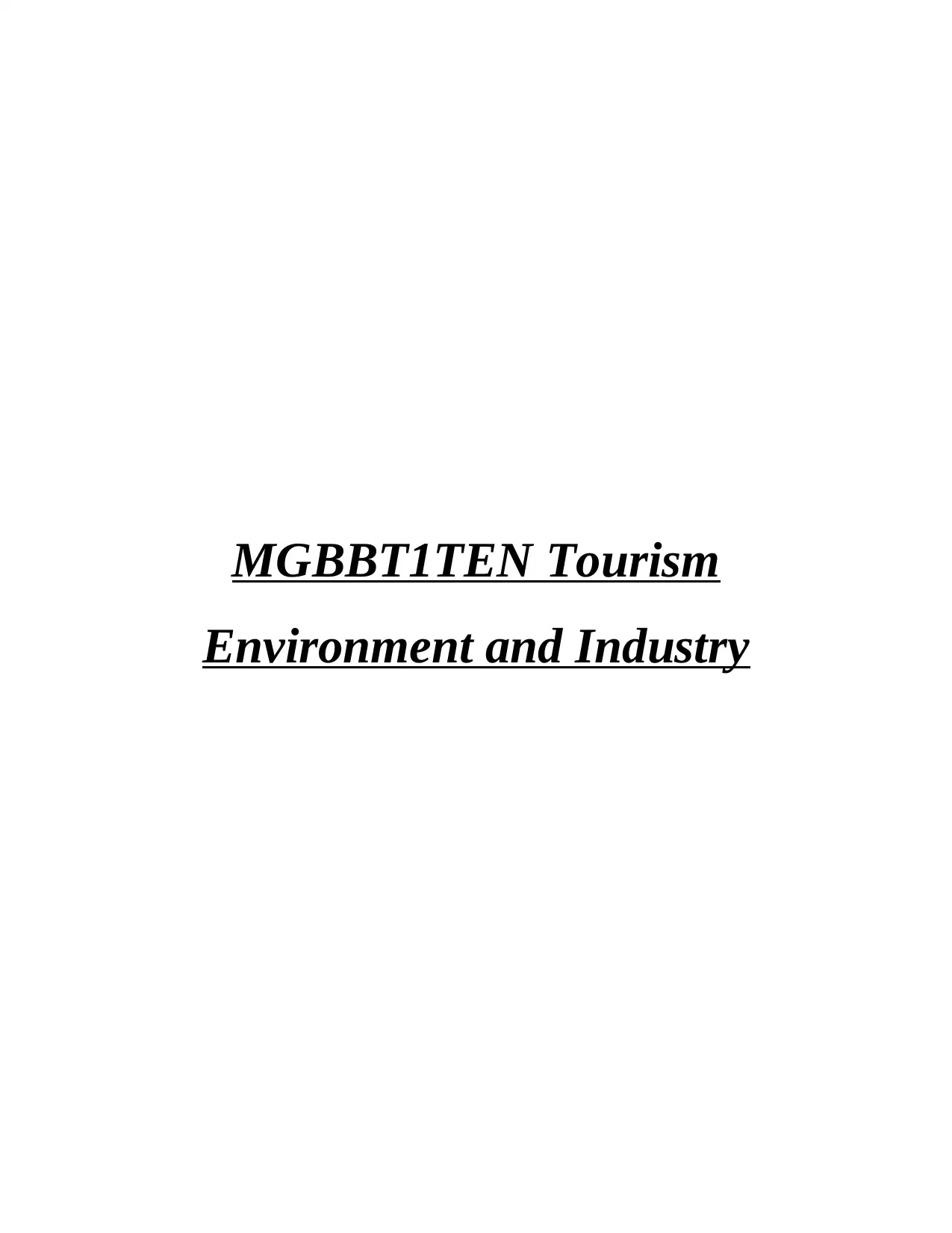
MGBBT1TEN Tourism
Environment and Industry
Environment and Industry
Paraphrase This Document
Need a fresh take? Get an instant paraphrase of this document with our AI Paraphraser
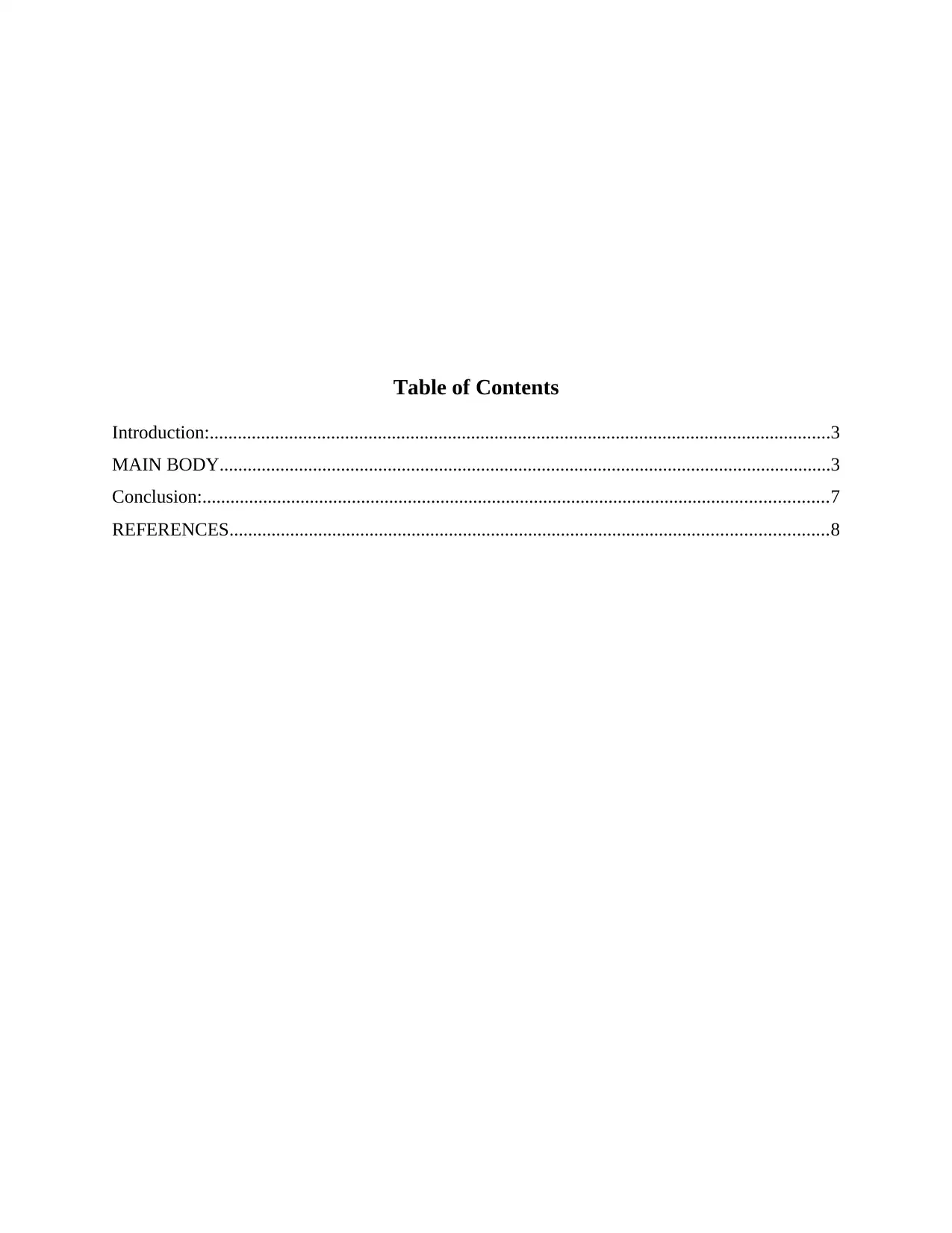
Table of Contents
Introduction:.....................................................................................................................................3
MAIN BODY...................................................................................................................................3
Conclusion:......................................................................................................................................7
REFERENCES................................................................................................................................8
Introduction:.....................................................................................................................................3
MAIN BODY...................................................................................................................................3
Conclusion:......................................................................................................................................7
REFERENCES................................................................................................................................8
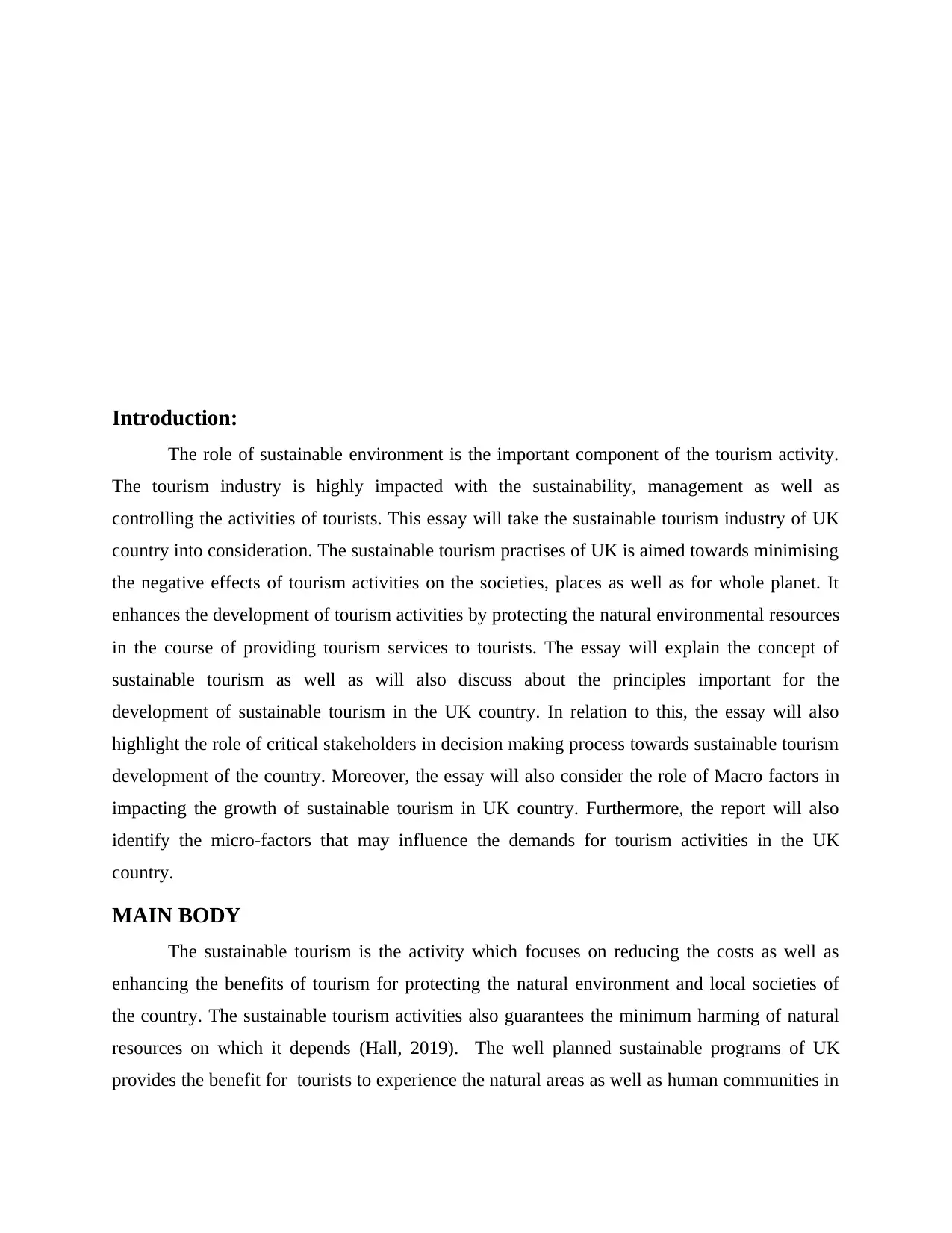
Introduction:
The role of sustainable environment is the important component of the tourism activity.
The tourism industry is highly impacted with the sustainability, management as well as
controlling the activities of tourists. This essay will take the sustainable tourism industry of UK
country into consideration. The sustainable tourism practises of UK is aimed towards minimising
the negative effects of tourism activities on the societies, places as well as for whole planet. It
enhances the development of tourism activities by protecting the natural environmental resources
in the course of providing tourism services to tourists. The essay will explain the concept of
sustainable tourism as well as will also discuss about the principles important for the
development of sustainable tourism in the UK country. In relation to this, the essay will also
highlight the role of critical stakeholders in decision making process towards sustainable tourism
development of the country. Moreover, the essay will also consider the role of Macro factors in
impacting the growth of sustainable tourism in UK country. Furthermore, the report will also
identify the micro-factors that may influence the demands for tourism activities in the UK
country.
MAIN BODY
The sustainable tourism is the activity which focuses on reducing the costs as well as
enhancing the benefits of tourism for protecting the natural environment and local societies of
the country. The sustainable tourism activities also guarantees the minimum harming of natural
resources on which it depends (Hall, 2019). The well planned sustainable programs of UK
provides the benefit for tourists to experience the natural areas as well as human communities in
The role of sustainable environment is the important component of the tourism activity.
The tourism industry is highly impacted with the sustainability, management as well as
controlling the activities of tourists. This essay will take the sustainable tourism industry of UK
country into consideration. The sustainable tourism practises of UK is aimed towards minimising
the negative effects of tourism activities on the societies, places as well as for whole planet. It
enhances the development of tourism activities by protecting the natural environmental resources
in the course of providing tourism services to tourists. The essay will explain the concept of
sustainable tourism as well as will also discuss about the principles important for the
development of sustainable tourism in the UK country. In relation to this, the essay will also
highlight the role of critical stakeholders in decision making process towards sustainable tourism
development of the country. Moreover, the essay will also consider the role of Macro factors in
impacting the growth of sustainable tourism in UK country. Furthermore, the report will also
identify the micro-factors that may influence the demands for tourism activities in the UK
country.
MAIN BODY
The sustainable tourism is the activity which focuses on reducing the costs as well as
enhancing the benefits of tourism for protecting the natural environment and local societies of
the country. The sustainable tourism activities also guarantees the minimum harming of natural
resources on which it depends (Hall, 2019). The well planned sustainable programs of UK
provides the benefit for tourists to experience the natural areas as well as human communities in
⊘ This is a preview!⊘
Do you want full access?
Subscribe today to unlock all pages.

Trusted by 1+ million students worldwide
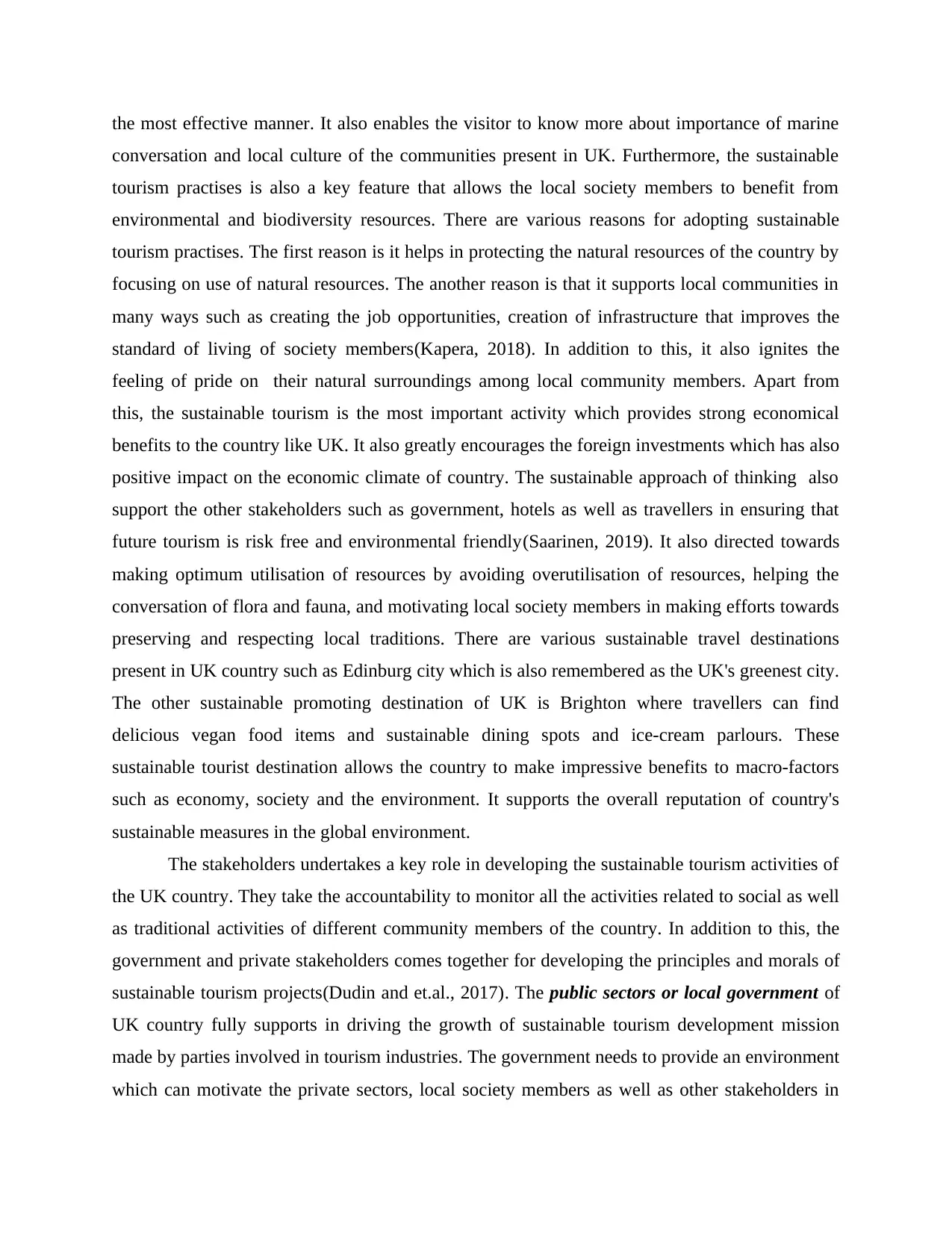
the most effective manner. It also enables the visitor to know more about importance of marine
conversation and local culture of the communities present in UK. Furthermore, the sustainable
tourism practises is also a key feature that allows the local society members to benefit from
environmental and biodiversity resources. There are various reasons for adopting sustainable
tourism practises. The first reason is it helps in protecting the natural resources of the country by
focusing on use of natural resources. The another reason is that it supports local communities in
many ways such as creating the job opportunities, creation of infrastructure that improves the
standard of living of society members(Kapera, 2018). In addition to this, it also ignites the
feeling of pride on their natural surroundings among local community members. Apart from
this, the sustainable tourism is the most important activity which provides strong economical
benefits to the country like UK. It also greatly encourages the foreign investments which has also
positive impact on the economic climate of country. The sustainable approach of thinking also
support the other stakeholders such as government, hotels as well as travellers in ensuring that
future tourism is risk free and environmental friendly(Saarinen, 2019). It also directed towards
making optimum utilisation of resources by avoiding overutilisation of resources, helping the
conversation of flora and fauna, and motivating local society members in making efforts towards
preserving and respecting local traditions. There are various sustainable travel destinations
present in UK country such as Edinburg city which is also remembered as the UK's greenest city.
The other sustainable promoting destination of UK is Brighton where travellers can find
delicious vegan food items and sustainable dining spots and ice-cream parlours. These
sustainable tourist destination allows the country to make impressive benefits to macro-factors
such as economy, society and the environment. It supports the overall reputation of country's
sustainable measures in the global environment.
The stakeholders undertakes a key role in developing the sustainable tourism activities of
the UK country. They take the accountability to monitor all the activities related to social as well
as traditional activities of different community members of the country. In addition to this, the
government and private stakeholders comes together for developing the principles and morals of
sustainable tourism projects(Dudin and et.al., 2017). The public sectors or local government of
UK country fully supports in driving the growth of sustainable tourism development mission
made by parties involved in tourism industries. The government needs to provide an environment
which can motivate the private sectors, local society members as well as other stakeholders in
conversation and local culture of the communities present in UK. Furthermore, the sustainable
tourism practises is also a key feature that allows the local society members to benefit from
environmental and biodiversity resources. There are various reasons for adopting sustainable
tourism practises. The first reason is it helps in protecting the natural resources of the country by
focusing on use of natural resources. The another reason is that it supports local communities in
many ways such as creating the job opportunities, creation of infrastructure that improves the
standard of living of society members(Kapera, 2018). In addition to this, it also ignites the
feeling of pride on their natural surroundings among local community members. Apart from
this, the sustainable tourism is the most important activity which provides strong economical
benefits to the country like UK. It also greatly encourages the foreign investments which has also
positive impact on the economic climate of country. The sustainable approach of thinking also
support the other stakeholders such as government, hotels as well as travellers in ensuring that
future tourism is risk free and environmental friendly(Saarinen, 2019). It also directed towards
making optimum utilisation of resources by avoiding overutilisation of resources, helping the
conversation of flora and fauna, and motivating local society members in making efforts towards
preserving and respecting local traditions. There are various sustainable travel destinations
present in UK country such as Edinburg city which is also remembered as the UK's greenest city.
The other sustainable promoting destination of UK is Brighton where travellers can find
delicious vegan food items and sustainable dining spots and ice-cream parlours. These
sustainable tourist destination allows the country to make impressive benefits to macro-factors
such as economy, society and the environment. It supports the overall reputation of country's
sustainable measures in the global environment.
The stakeholders undertakes a key role in developing the sustainable tourism activities of
the UK country. They take the accountability to monitor all the activities related to social as well
as traditional activities of different community members of the country. In addition to this, the
government and private stakeholders comes together for developing the principles and morals of
sustainable tourism projects(Dudin and et.al., 2017). The public sectors or local government of
UK country fully supports in driving the growth of sustainable tourism development mission
made by parties involved in tourism industries. The government needs to provide an environment
which can motivate the private sectors, local society members as well as other stakeholders in
Paraphrase This Document
Need a fresh take? Get an instant paraphrase of this document with our AI Paraphraser
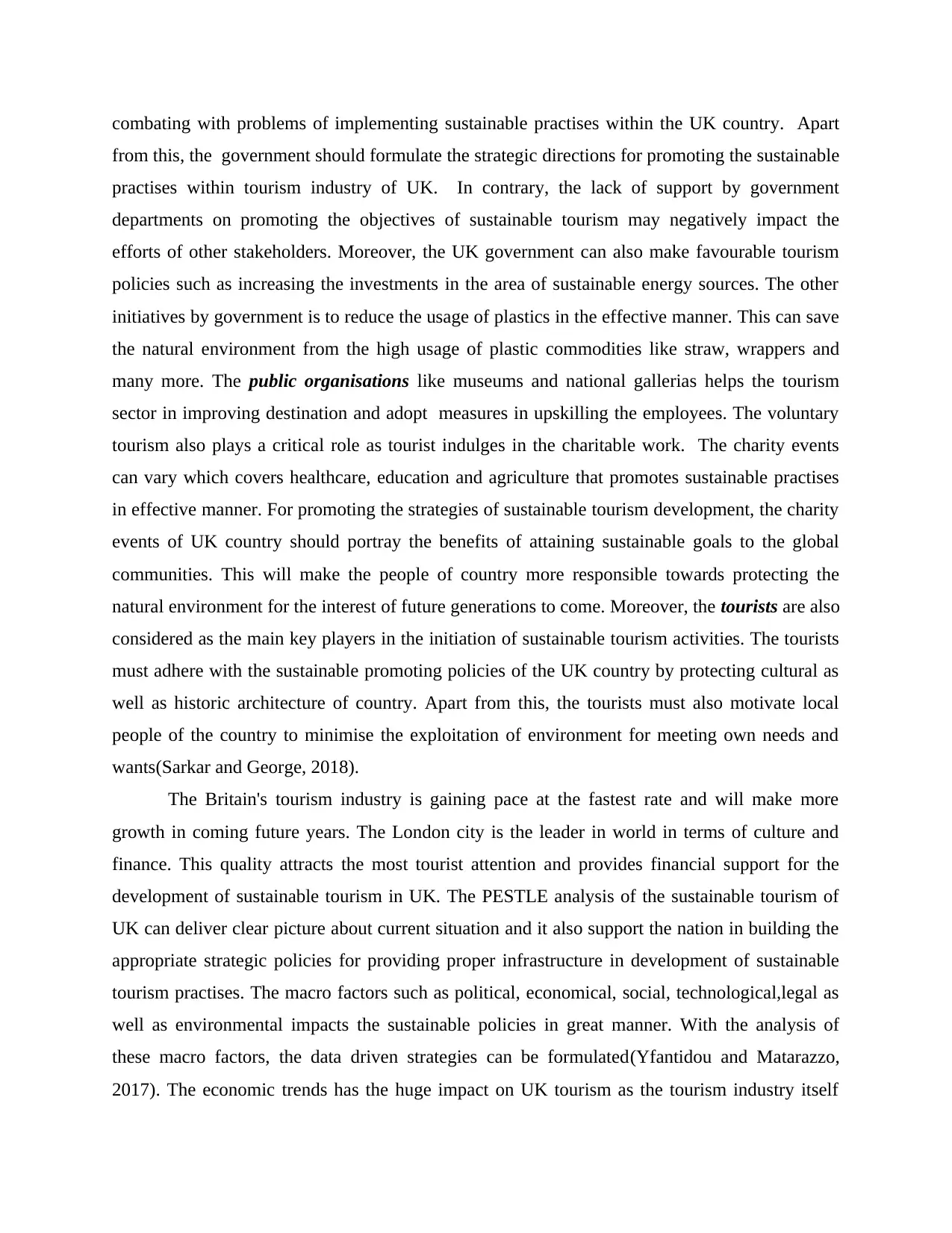
combating with problems of implementing sustainable practises within the UK country. Apart
from this, the government should formulate the strategic directions for promoting the sustainable
practises within tourism industry of UK. In contrary, the lack of support by government
departments on promoting the objectives of sustainable tourism may negatively impact the
efforts of other stakeholders. Moreover, the UK government can also make favourable tourism
policies such as increasing the investments in the area of sustainable energy sources. The other
initiatives by government is to reduce the usage of plastics in the effective manner. This can save
the natural environment from the high usage of plastic commodities like straw, wrappers and
many more. The public organisations like museums and national gallerias helps the tourism
sector in improving destination and adopt measures in upskilling the employees. The voluntary
tourism also plays a critical role as tourist indulges in the charitable work. The charity events
can vary which covers healthcare, education and agriculture that promotes sustainable practises
in effective manner. For promoting the strategies of sustainable tourism development, the charity
events of UK country should portray the benefits of attaining sustainable goals to the global
communities. This will make the people of country more responsible towards protecting the
natural environment for the interest of future generations to come. Moreover, the tourists are also
considered as the main key players in the initiation of sustainable tourism activities. The tourists
must adhere with the sustainable promoting policies of the UK country by protecting cultural as
well as historic architecture of country. Apart from this, the tourists must also motivate local
people of the country to minimise the exploitation of environment for meeting own needs and
wants(Sarkar and George, 2018).
The Britain's tourism industry is gaining pace at the fastest rate and will make more
growth in coming future years. The London city is the leader in world in terms of culture and
finance. This quality attracts the most tourist attention and provides financial support for the
development of sustainable tourism in UK. The PESTLE analysis of the sustainable tourism of
UK can deliver clear picture about current situation and it also support the nation in building the
appropriate strategic policies for providing proper infrastructure in development of sustainable
tourism practises. The macro factors such as political, economical, social, technological,legal as
well as environmental impacts the sustainable policies in great manner. With the analysis of
these macro factors, the data driven strategies can be formulated(Yfantidou and Matarazzo,
2017). The economic trends has the huge impact on UK tourism as the tourism industry itself
from this, the government should formulate the strategic directions for promoting the sustainable
practises within tourism industry of UK. In contrary, the lack of support by government
departments on promoting the objectives of sustainable tourism may negatively impact the
efforts of other stakeholders. Moreover, the UK government can also make favourable tourism
policies such as increasing the investments in the area of sustainable energy sources. The other
initiatives by government is to reduce the usage of plastics in the effective manner. This can save
the natural environment from the high usage of plastic commodities like straw, wrappers and
many more. The public organisations like museums and national gallerias helps the tourism
sector in improving destination and adopt measures in upskilling the employees. The voluntary
tourism also plays a critical role as tourist indulges in the charitable work. The charity events
can vary which covers healthcare, education and agriculture that promotes sustainable practises
in effective manner. For promoting the strategies of sustainable tourism development, the charity
events of UK country should portray the benefits of attaining sustainable goals to the global
communities. This will make the people of country more responsible towards protecting the
natural environment for the interest of future generations to come. Moreover, the tourists are also
considered as the main key players in the initiation of sustainable tourism activities. The tourists
must adhere with the sustainable promoting policies of the UK country by protecting cultural as
well as historic architecture of country. Apart from this, the tourists must also motivate local
people of the country to minimise the exploitation of environment for meeting own needs and
wants(Sarkar and George, 2018).
The Britain's tourism industry is gaining pace at the fastest rate and will make more
growth in coming future years. The London city is the leader in world in terms of culture and
finance. This quality attracts the most tourist attention and provides financial support for the
development of sustainable tourism in UK. The PESTLE analysis of the sustainable tourism of
UK can deliver clear picture about current situation and it also support the nation in building the
appropriate strategic policies for providing proper infrastructure in development of sustainable
tourism practises. The macro factors such as political, economical, social, technological,legal as
well as environmental impacts the sustainable policies in great manner. With the analysis of
these macro factors, the data driven strategies can be formulated(Yfantidou and Matarazzo,
2017). The economic trends has the huge impact on UK tourism as the tourism industry itself
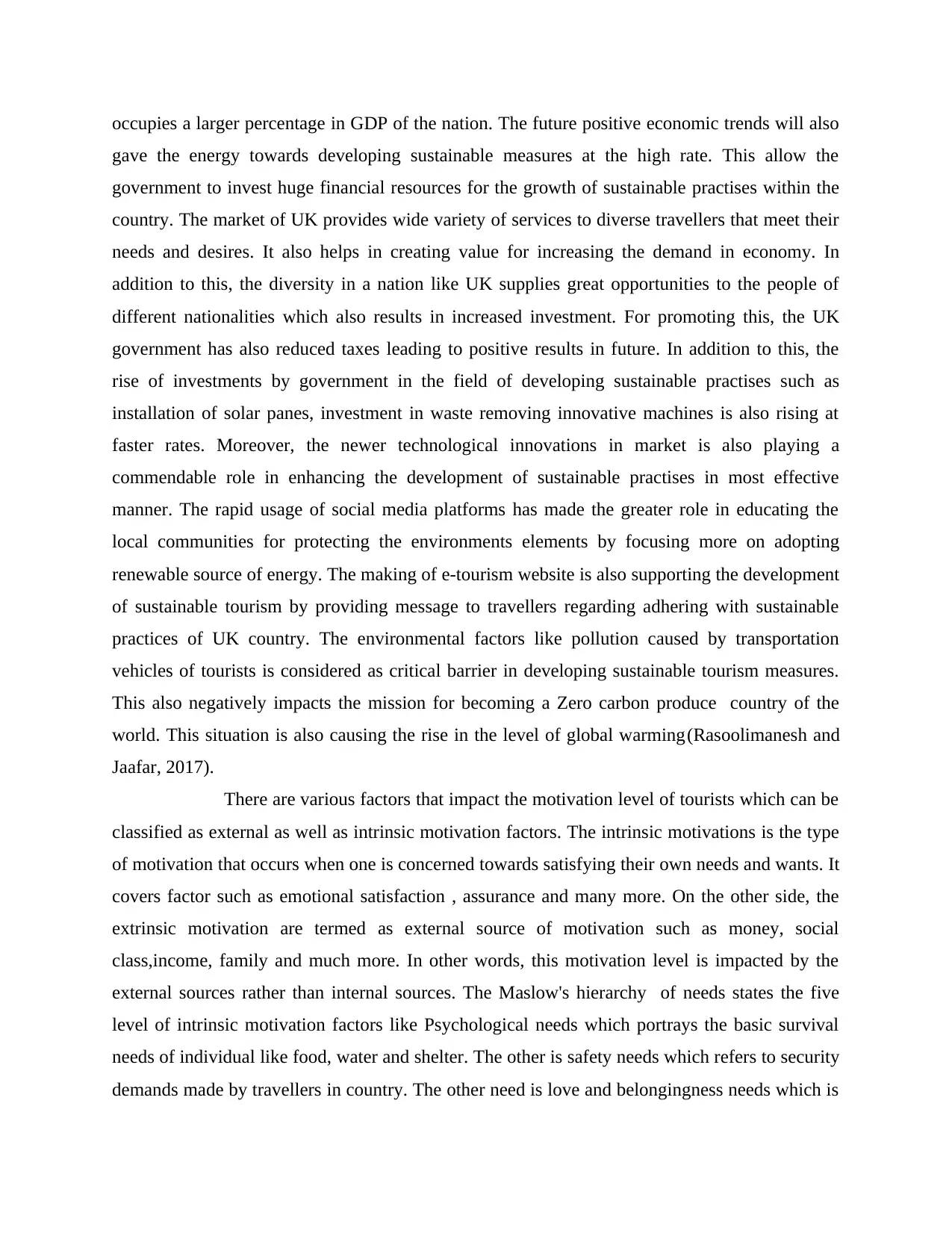
occupies a larger percentage in GDP of the nation. The future positive economic trends will also
gave the energy towards developing sustainable measures at the high rate. This allow the
government to invest huge financial resources for the growth of sustainable practises within the
country. The market of UK provides wide variety of services to diverse travellers that meet their
needs and desires. It also helps in creating value for increasing the demand in economy. In
addition to this, the diversity in a nation like UK supplies great opportunities to the people of
different nationalities which also results in increased investment. For promoting this, the UK
government has also reduced taxes leading to positive results in future. In addition to this, the
rise of investments by government in the field of developing sustainable practises such as
installation of solar panes, investment in waste removing innovative machines is also rising at
faster rates. Moreover, the newer technological innovations in market is also playing a
commendable role in enhancing the development of sustainable practises in most effective
manner. The rapid usage of social media platforms has made the greater role in educating the
local communities for protecting the environments elements by focusing more on adopting
renewable source of energy. The making of e-tourism website is also supporting the development
of sustainable tourism by providing message to travellers regarding adhering with sustainable
practices of UK country. The environmental factors like pollution caused by transportation
vehicles of tourists is considered as critical barrier in developing sustainable tourism measures.
This also negatively impacts the mission for becoming a Zero carbon produce country of the
world. This situation is also causing the rise in the level of global warming(Rasoolimanesh and
Jaafar, 2017).
There are various factors that impact the motivation level of tourists which can be
classified as external as well as intrinsic motivation factors. The intrinsic motivations is the type
of motivation that occurs when one is concerned towards satisfying their own needs and wants. It
covers factor such as emotional satisfaction , assurance and many more. On the other side, the
extrinsic motivation are termed as external source of motivation such as money, social
class,income, family and much more. In other words, this motivation level is impacted by the
external sources rather than internal sources. The Maslow's hierarchy of needs states the five
level of intrinsic motivation factors like Psychological needs which portrays the basic survival
needs of individual like food, water and shelter. The other is safety needs which refers to security
demands made by travellers in country. The other need is love and belongingness needs which is
gave the energy towards developing sustainable measures at the high rate. This allow the
government to invest huge financial resources for the growth of sustainable practises within the
country. The market of UK provides wide variety of services to diverse travellers that meet their
needs and desires. It also helps in creating value for increasing the demand in economy. In
addition to this, the diversity in a nation like UK supplies great opportunities to the people of
different nationalities which also results in increased investment. For promoting this, the UK
government has also reduced taxes leading to positive results in future. In addition to this, the
rise of investments by government in the field of developing sustainable practises such as
installation of solar panes, investment in waste removing innovative machines is also rising at
faster rates. Moreover, the newer technological innovations in market is also playing a
commendable role in enhancing the development of sustainable practises in most effective
manner. The rapid usage of social media platforms has made the greater role in educating the
local communities for protecting the environments elements by focusing more on adopting
renewable source of energy. The making of e-tourism website is also supporting the development
of sustainable tourism by providing message to travellers regarding adhering with sustainable
practices of UK country. The environmental factors like pollution caused by transportation
vehicles of tourists is considered as critical barrier in developing sustainable tourism measures.
This also negatively impacts the mission for becoming a Zero carbon produce country of the
world. This situation is also causing the rise in the level of global warming(Rasoolimanesh and
Jaafar, 2017).
There are various factors that impact the motivation level of tourists which can be
classified as external as well as intrinsic motivation factors. The intrinsic motivations is the type
of motivation that occurs when one is concerned towards satisfying their own needs and wants. It
covers factor such as emotional satisfaction , assurance and many more. On the other side, the
extrinsic motivation are termed as external source of motivation such as money, social
class,income, family and much more. In other words, this motivation level is impacted by the
external sources rather than internal sources. The Maslow's hierarchy of needs states the five
level of intrinsic motivation factors like Psychological needs which portrays the basic survival
needs of individual like food, water and shelter. The other is safety needs which refers to security
demands made by travellers in country. The other need is love and belongingness needs which is
⊘ This is a preview!⊘
Do you want full access?
Subscribe today to unlock all pages.

Trusted by 1+ million students worldwide
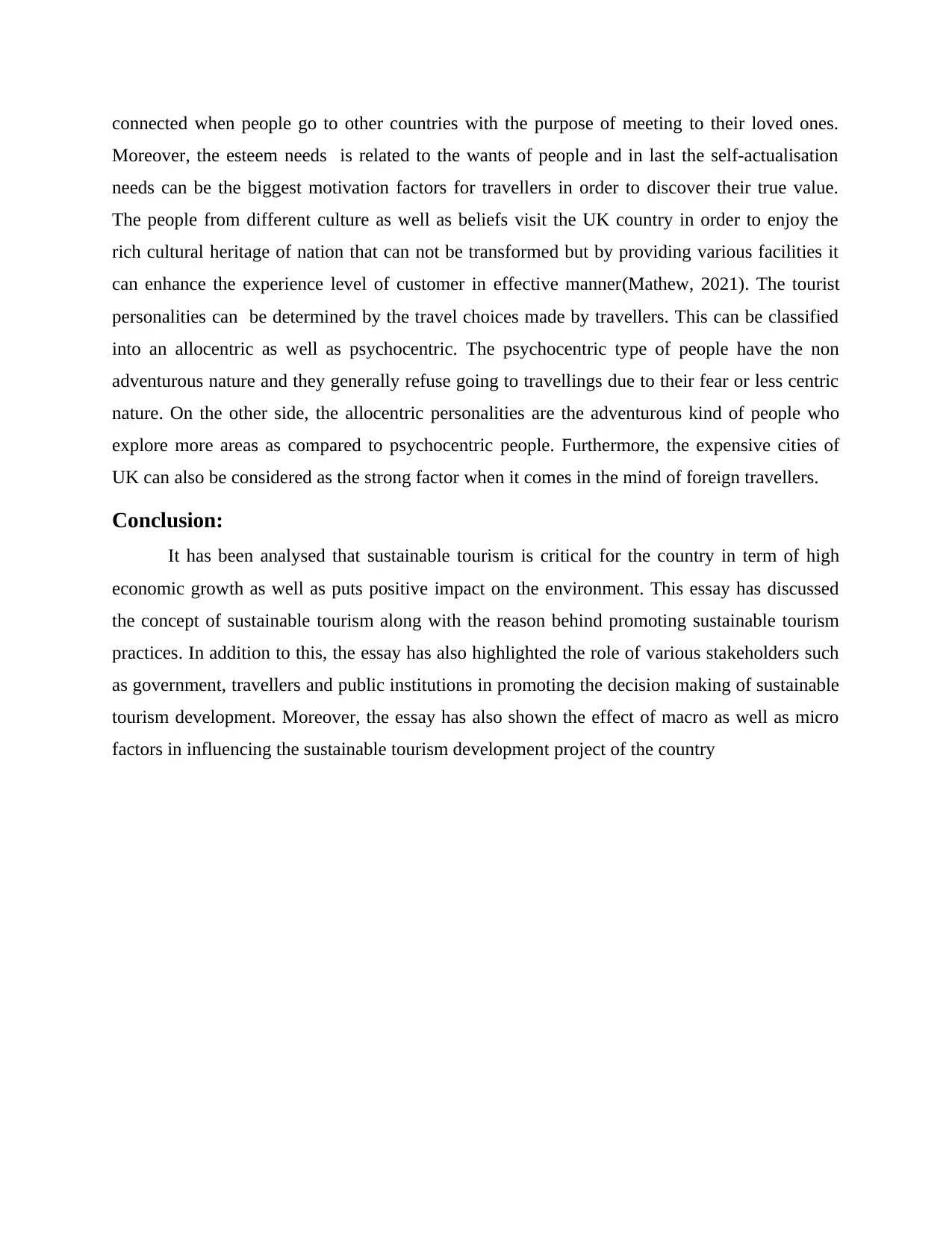
connected when people go to other countries with the purpose of meeting to their loved ones.
Moreover, the esteem needs is related to the wants of people and in last the self-actualisation
needs can be the biggest motivation factors for travellers in order to discover their true value.
The people from different culture as well as beliefs visit the UK country in order to enjoy the
rich cultural heritage of nation that can not be transformed but by providing various facilities it
can enhance the experience level of customer in effective manner(Mathew, 2021). The tourist
personalities can be determined by the travel choices made by travellers. This can be classified
into an allocentric as well as psychocentric. The psychocentric type of people have the non
adventurous nature and they generally refuse going to travellings due to their fear or less centric
nature. On the other side, the allocentric personalities are the adventurous kind of people who
explore more areas as compared to psychocentric people. Furthermore, the expensive cities of
UK can also be considered as the strong factor when it comes in the mind of foreign travellers.
Conclusion:
It has been analysed that sustainable tourism is critical for the country in term of high
economic growth as well as puts positive impact on the environment. This essay has discussed
the concept of sustainable tourism along with the reason behind promoting sustainable tourism
practices. In addition to this, the essay has also highlighted the role of various stakeholders such
as government, travellers and public institutions in promoting the decision making of sustainable
tourism development. Moreover, the essay has also shown the effect of macro as well as micro
factors in influencing the sustainable tourism development project of the country
Moreover, the esteem needs is related to the wants of people and in last the self-actualisation
needs can be the biggest motivation factors for travellers in order to discover their true value.
The people from different culture as well as beliefs visit the UK country in order to enjoy the
rich cultural heritage of nation that can not be transformed but by providing various facilities it
can enhance the experience level of customer in effective manner(Mathew, 2021). The tourist
personalities can be determined by the travel choices made by travellers. This can be classified
into an allocentric as well as psychocentric. The psychocentric type of people have the non
adventurous nature and they generally refuse going to travellings due to their fear or less centric
nature. On the other side, the allocentric personalities are the adventurous kind of people who
explore more areas as compared to psychocentric people. Furthermore, the expensive cities of
UK can also be considered as the strong factor when it comes in the mind of foreign travellers.
Conclusion:
It has been analysed that sustainable tourism is critical for the country in term of high
economic growth as well as puts positive impact on the environment. This essay has discussed
the concept of sustainable tourism along with the reason behind promoting sustainable tourism
practices. In addition to this, the essay has also highlighted the role of various stakeholders such
as government, travellers and public institutions in promoting the decision making of sustainable
tourism development. Moreover, the essay has also shown the effect of macro as well as micro
factors in influencing the sustainable tourism development project of the country
Paraphrase This Document
Need a fresh take? Get an instant paraphrase of this document with our AI Paraphraser
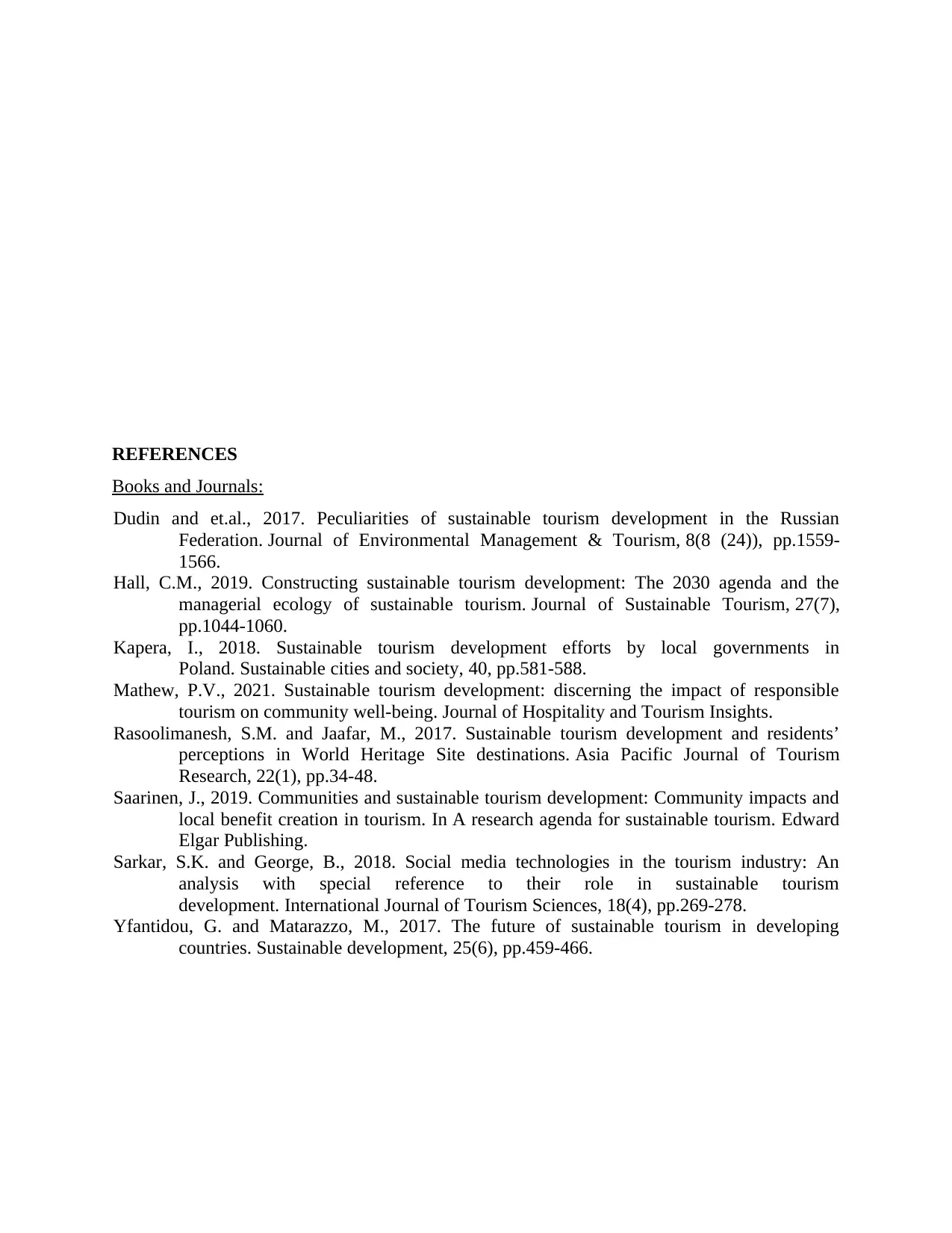
REFERENCES
Books and Journals:
Dudin and et.al., 2017. Peculiarities of sustainable tourism development in the Russian
Federation. Journal of Environmental Management & Tourism, 8(8 (24)), pp.1559-
1566.
Hall, C.M., 2019. Constructing sustainable tourism development: The 2030 agenda and the
managerial ecology of sustainable tourism. Journal of Sustainable Tourism, 27(7),
pp.1044-1060.
Kapera, I., 2018. Sustainable tourism development efforts by local governments in
Poland. Sustainable cities and society, 40, pp.581-588.
Mathew, P.V., 2021. Sustainable tourism development: discerning the impact of responsible
tourism on community well-being. Journal of Hospitality and Tourism Insights.
Rasoolimanesh, S.M. and Jaafar, M., 2017. Sustainable tourism development and residents’
perceptions in World Heritage Site destinations. Asia Pacific Journal of Tourism
Research, 22(1), pp.34-48.
Saarinen, J., 2019. Communities and sustainable tourism development: Community impacts and
local benefit creation in tourism. In A research agenda for sustainable tourism. Edward
Elgar Publishing.
Sarkar, S.K. and George, B., 2018. Social media technologies in the tourism industry: An
analysis with special reference to their role in sustainable tourism
development. International Journal of Tourism Sciences, 18(4), pp.269-278.
Yfantidou, G. and Matarazzo, M., 2017. The future of sustainable tourism in developing
countries. Sustainable development, 25(6), pp.459-466.
Books and Journals:
Dudin and et.al., 2017. Peculiarities of sustainable tourism development in the Russian
Federation. Journal of Environmental Management & Tourism, 8(8 (24)), pp.1559-
1566.
Hall, C.M., 2019. Constructing sustainable tourism development: The 2030 agenda and the
managerial ecology of sustainable tourism. Journal of Sustainable Tourism, 27(7),
pp.1044-1060.
Kapera, I., 2018. Sustainable tourism development efforts by local governments in
Poland. Sustainable cities and society, 40, pp.581-588.
Mathew, P.V., 2021. Sustainable tourism development: discerning the impact of responsible
tourism on community well-being. Journal of Hospitality and Tourism Insights.
Rasoolimanesh, S.M. and Jaafar, M., 2017. Sustainable tourism development and residents’
perceptions in World Heritage Site destinations. Asia Pacific Journal of Tourism
Research, 22(1), pp.34-48.
Saarinen, J., 2019. Communities and sustainable tourism development: Community impacts and
local benefit creation in tourism. In A research agenda for sustainable tourism. Edward
Elgar Publishing.
Sarkar, S.K. and George, B., 2018. Social media technologies in the tourism industry: An
analysis with special reference to their role in sustainable tourism
development. International Journal of Tourism Sciences, 18(4), pp.269-278.
Yfantidou, G. and Matarazzo, M., 2017. The future of sustainable tourism in developing
countries. Sustainable development, 25(6), pp.459-466.
1 out of 8
Related Documents
Your All-in-One AI-Powered Toolkit for Academic Success.
+13062052269
info@desklib.com
Available 24*7 on WhatsApp / Email
![[object Object]](/_next/static/media/star-bottom.7253800d.svg)
Unlock your academic potential
Copyright © 2020–2025 A2Z Services. All Rights Reserved. Developed and managed by ZUCOL.


